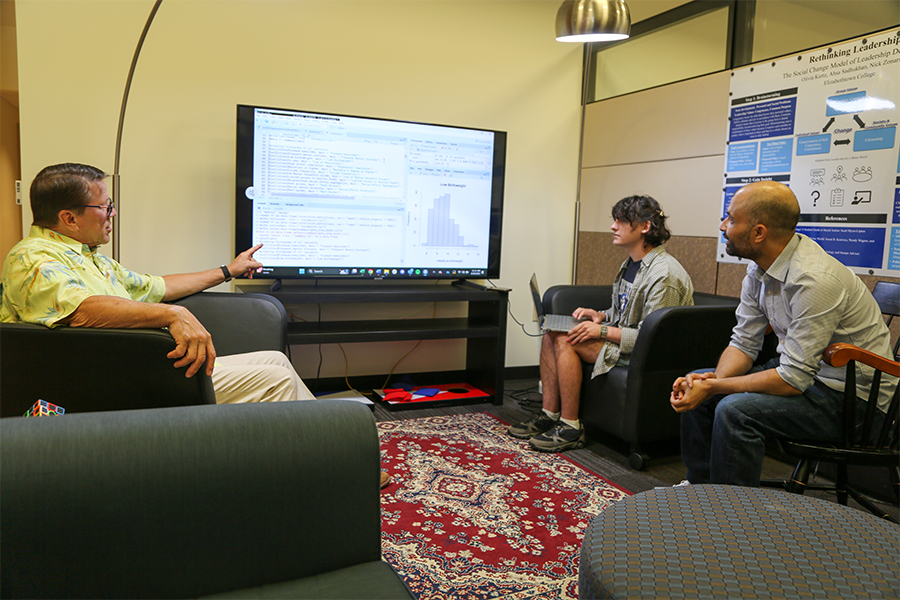Gabriel Karl ’25 is working alongside faculty mentors Public Health Program Director and Lecturer Dr. Robert Aronson and Assistant Professor of Mathematical Sciences Dr. Sakar Sigdel this summer in an interdisciplinary research project to determine how a variety of factors within large population cities influence public health as part of the Elizabethtown College Summer Creative Arts and Research Program (SCARP).
As part of his interdisciplinary research, Karl is viewing public data and using the City Health Dashboard to analyze the metrics of over 200 cities with a population of over 70,000 to gain a statistical background on public health. Karl attended the Policy Action Institute in Washington D.C. this past June to learn more about advocacy for how to make a positive change.
The goal of Karl’s research is to write and publish a paper to present at the American Public Health Conference, where the Political Science and Economics major furthered his advocacy efforts by learning effective methods of telling the story behind the data.
Title of Research
Effects of Political-Economy and Land Use on Population Health
Student Researcher
Gabriel Karl ’25 (Political Science and Economics major)
Faculty Mentors
Dr. Robert Aronson, Public Health Program Director and Lecturer
Dr. Sakar Sigdel, Assistant Professor of Mathematical Sciences
What are you researching?
Karl: I am using publicly available data to build a model of population health at the city level. The goal is to see how factors like political environment, economic conditions, and built environment impact gun violence, mental health, and birth weight affect those populations. I hope the findings can be applied in policy making and aid in creating healthier cities.
Why did you choose this topic?
Karl: I chose this topic because I have a passion for helping people. Urbanism, public health, and political economy are personal academic and career interests. I tend to think on the systems level: how political and economic institutions and systems interact to create our society. Public health is how we see the real human impact of those systems.
What is the most interesting aspect of this research?
Karl: The most interesting aspect of this research is that we can use data and statistical methods to reveal details about how society works, which is exciting to me. People would be surprised by some of the things affecting their health that don’t fall under the domain of medicine.
How have your faculty mentors helped you?
Karl: I have loved working with Dr. Aronson and Dr. Sigdel on this project. They are both incredible professors and mentors. Dr. Aronson’s expertise in public health and Dr. Sigdel’s help on the statistical model-building side have helped to elevate this paper.
Hear from the faculty mentors – Dr. Robert Aronson and Dr. Sakar Sigdel
“To understand the factors influencing the health of populations (and differences between population groups), we need to draw on the biological/medical sciences as well as the social/behavioral/economic/political sciences, as well as the best methodological approaches for measuring those factors and the statistical tools for analysis of the data,” Aronson said. “This is an interdisciplinary endeavor. Our understanding of the determinants of health shows us that no singular discipline is adequate.”
“I believe getting involved in SCARP is a wonderful opportunity for any professor here at Etown,” Sigdel said. “For me, the most rewarding aspect of the program is the opportunity to work with students on research topics of mutual interest. There is also the opportunity for interdisciplinary collaboration, like in this research project, which I find extremely appealing. Lastly, SCARP gives students valuable research and learning experience, which I feel honored to be a part of.”

